An Afghan poem of hope
after his family was slaughtered (photo by Turaj Rais)
ISLAMABAD, October 8, 2014 - Abuzar's eyes were full of joy as he awoke in his family apartment in Toronto last week.
Finally, the big day he had been anticipating for weeks had come. He picked up his small backpack, his bottle and his Spiderman lunchbox, and set off for his first day at nursery after six months of rehabilitative care.
As he played in the middle of a crowd of hyperactive three-year-olds, no one could guess that the presence of the happy little Afghan was a small miracle.
For Abuzar, it was another tiny step toward building a new life more than 10,000 kilometres from his his hometown Kabul, where tragedy had robbed him of his parents, brother and sister eight months earlier.
The attack
On the night of March 20 in Kabul, four young Taliban gunmen burst in to the restaurant of the luxury Serena Hotel, where journalists regularly meet to interview diplomats, ministers and other officials.
Fate would have it that Sardar Ahmad, a pillar of the AFP bureau for more than a decade and a frequent visitor, found himself there that evening.
The experienced journalist and devoted father had decided to take out his wife Homaira and their three children: six-year-old Nilofar, five-year-old Omar, and Abuzar, then aged two, for a meal on the occasion of Nowruz, the Persian New Year.
In a cruel and unusual twist the insurgents chose not to spare even the children, whom they shot in the head from close range like the others.
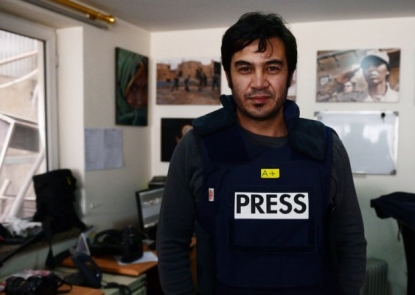 This picture of Sardar was taken just hours before he was killed, March 20, 2014. (AFP Photo / Wakil Kohsar)
This picture of Sardar was taken just hours before he was killed, March 20, 2014. (AFP Photo / Wakil Kohsar)Amid the carnage, a series of tiny miracles saved the infant's life.
The first bullet grazed Abuzar's chest without penetrating. The second cut through his thigh without touching a major blood vessel. The third cracked his skull but crucially remained within the bone. The proximity, and quality, of an NGO-run hospital allowed him to be operated on within 10 minutes of arriving.
The little things that, six months and a few butterfly wing beats later, gave him a new start on the other side of the world.
A fresh start was the last thing on anyone's mind, however, on the night of the attack, when medics' thoughts were preoccupied with preventing a life threatening infection from taking hold.
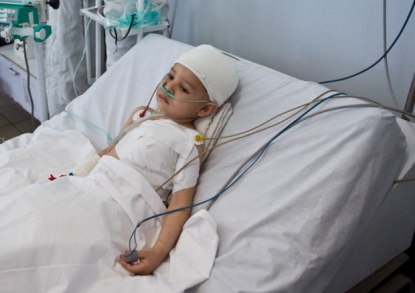 Abuzar Ahmad lies on a bed at a local hospital in Kabul on March 25, 2014 (AFP Photo / Shah Marai)
Abuzar Ahmad lies on a bed at a local hospital in Kabul on March 25, 2014 (AFP Photo / Shah Marai)Two days later, his father, mother, brother and sister were buried, in a day of infinite tears and sadness. Hundreds came to say their farewells and express their outrage at the horrific attack that had pushed the boundaries of human cruelty.
Tributes poured in from across the world in memory of Sardar, from French President Francois Hollande to US Secretary of State John Kerry. Local TV channels broadcast the funeral live, following the long convoy of cars carrying portraits of the family, which some passersby reached out to touch as though they were relics.
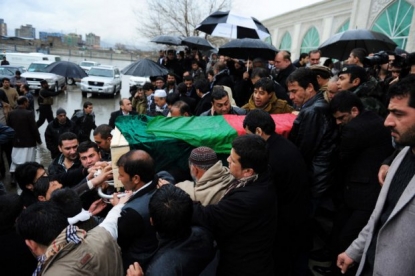 Friends and family of Afghan AFP reporter Sardar Ahmad carry his casket as they leave a mosque and head to the cemetery during his funeral in Kabul on March 23, 2014 (AFP Photo / Roberto Schmidt)
Friends and family of Afghan AFP reporter Sardar Ahmad carry his casket as they leave a mosque and head to the cemetery during his funeral in Kabul on March 23, 2014 (AFP Photo / Roberto Schmidt)The dynamic Afghan media that was born after the fall of the Taliban had lost one of its stars and mentor figures, while AFP was deprived of a "five star journalist" according to Ben Sheppard, the Kabul bureau chief, in a moving tribute.
Sardar was an optimist and a patriot who refused to leave his country, too enamoured was he with his people and proud of their heritage.
His loss has been felt deeply by the bureau, where his portraits, decorated with flowers now adorn every room. You could not enter the newsroom without catching his intense gaze -- shy and silent with strangers, teasing and grinning with those he knew well.
The big giant of a man who would lift his eyes from his screen to break into a Persian folk song, obviously about love, or crack a bawdy joke. "Where are you, my friend? My eyes search for you," tweeted our photographer Shah Marai, his old comrade, on the day of the funeral.
At the emergency ward of the hospital, meanwhile, a small flame had been reignited that would bring a measure of light amid the darkness. Abuzar, swaddled in bandages and connected to drips, was still alive.
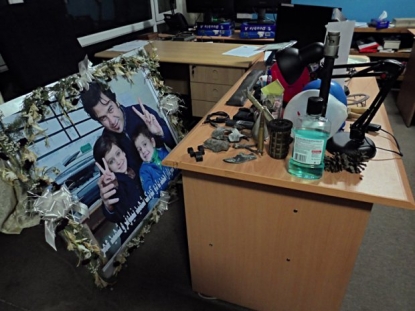 The desk where Sardar Ahmad used to work at the AFP Kabul bureau (AFP Photo / Emmanuel Duparcq)
The desk where Sardar Ahmad used to work at the AFP Kabul bureau (AFP Photo / Emmanuel Duparcq)It is difficult, even today, to convey the intense emotions we went through two days later, on March 25, when the doctors declared Abuzar out of danger. It brought endless relief after days of torment both among his relatives and staff at the AFP bureau.
The road to recovery
"Abu" would live, but what would his life be like? If the wounds to the chest and leg weren't enough, he would have to contend with his head injury and the risk of serious consequences and disability if the brain was affected.
The recovery, however, was swift and dramatic, observed over daily visits: in a few days Abuzar began speaking again. Then playing a video game, joking, laughing. His games, conversations with family and appetite for life demonstrated he had not suffered neurological damage so far.
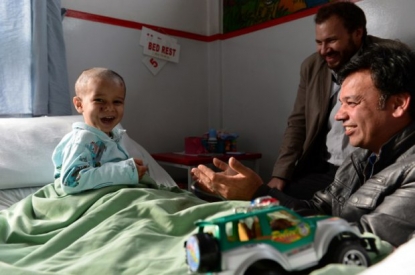 Abuzar plays during a visit by his uncle Bashir Mirzad (R) and AFP Bureau Chief for Pakistan-Afghanistan Emmanuel Duparcq (C) at a local hospital in Kabul on April 6, 2014 (AFP Photo / Wakil Kohsar)
Abuzar plays during a visit by his uncle Bashir Mirzad (R) and AFP Bureau Chief for Pakistan-Afghanistan Emmanuel Duparcq (C) at a local hospital in Kabul on April 6, 2014 (AFP Photo / Wakil Kohsar)Other moments seemed to suggest that it was not all plain sailing. At the hospital, when he wasn't busy playing, Abuzar sometimes looked like he was he was lost in unfathomably sad memories and would grow tense. Especially when unwanted strangers found themselves in the ward of the "little miracle" to hug him and pose for photos.
The family meanwhile busied themselves preparing for the future.
Along with his doctors, they felt that leaving Afghanistan for a more stable country with better healthcare would give Abuzar the best chance of rebuilding his life, away from the daily violence that wracked his homeland and could trigger fresh trauma in him.
Canada was their first choice - specifically Toronto - where two of Sardar's brothers and dozens of cousins were settled.
They decided to have Abuzar adopted by his 25-year-old cousin Turaj, who knew him well, and his wife, who was pregnant with twins.
The plan was well laid-out: if the family emigrated to Canada, Abuzar would soon become a big brother, and therefore an integral member of the family, avoiding the fate of many Afghan orphans thrust upon already-established families for whom they might be seen as a burden.
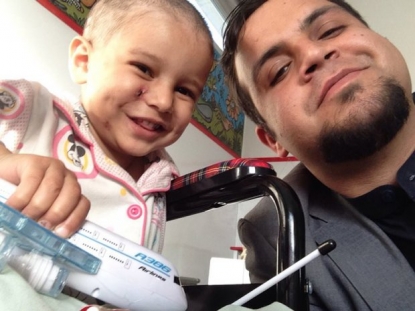
Abuzar and his cousin Turaj in Kabul on April 8, 2014 (photo by Turaj Rais)
Now it was time to convince the Canadian government.
The issue was not entirely straightforward, but Ottawa, which deployed troops against the Taliban from 2001 to 2011, lent from the outset a sympathetic ear to Abuzar's plight, which was being told around the world including in Canada.
In Toronto the local Afghan community had begun to raise its voice to call for him to come.
By April 15, less than a month after the attack, Abuzar left hospital and began a new family life moving in with his adopted parents in downtown Kabul.
How much had he remembered about what had happened? After the attack, his first words at the hospital were a call for his mother.
Over time, he began speaking less and less about his missing parents, brother and sister, except for rare moments when his eyes grew weary, his face tense, and he said something to suggest he understood they wouldn't be coming back.
Ten days later, on April 25, Abuzar and his adopted parents obtained their visas for Canada. We took off from Kabul on the 29th, with Turaj, his heavily-pregnant wife and Abuzar in a stroller for a two day journey with a one-night stopover in an Istanbul suburb.
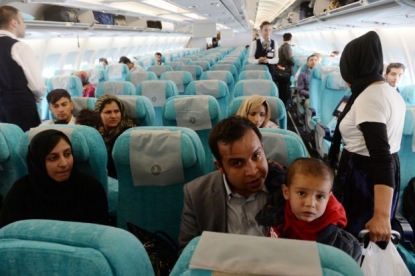 Abuzar sits with his cousin Turaj in a plane moments before leaving Kabul for Canada (AFP Photo / Shah Marai)
Abuzar sits with his cousin Turaj in a plane moments before leaving Kabul for Canada (AFP Photo / Shah Marai)On the other side of the Atlantic, Abuzar's family in Toronto was growing ever more excited. As we were leaving Kabul, Farid - one of Sardar's two brothers based in Canada for 10 years, who had been inconsolable after his death, posted a poem on his Facebook page:
"Today, those separated from us want to be alive again.
I can smell the scent coming from the East.
the sweet scent of rose, lily and jasmine
My life (taken away) wants to come back again"
A new world
Wednesday, April 30. The plane arrives in Toronto more than three hours late. It is close to midnight, but when Abuzar and his new parents enter the arrival hall it begins to reverberate to the cheers of dozens of Afghan-Canadians, family and friends.
They carry placards and giant photographs and are surrounded by local media teams alerted by the fever gripping the local Afghan community.
The crowd overwhelms the newly-arrived family with warm embraces and tears. Abuzar is passed from one set of arms to the next, taken aback by all the fuss and the hugs, that convey the intense happiness of welcoming him along with the infinite grief over those lost at the Serena.
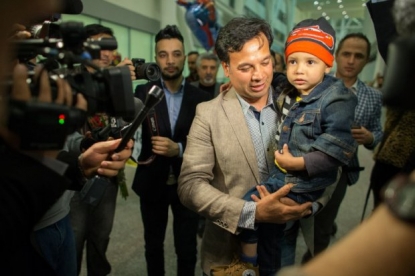 Bashir Mirzad holds his nephew Abuzar Ahmad as he is greeted by nearly 100 family and well wishers at Pearson Airport in Toronto, Ontario, Canada, April 30, 2014 (AFP Photo / Geoff Robins)
Bashir Mirzad holds his nephew Abuzar Ahmad as he is greeted by nearly 100 family and well wishers at Pearson Airport in Toronto, Ontario, Canada, April 30, 2014 (AFP Photo / Geoff Robins)At the airport exit a surprise lies in wait: a black limousine waits for Abuzar! The luxury taxi was paid for by an Afghan businessman in Toronto, unknown to the family but moved by their story.
The little man of the hour opens his dark eyes a little wider as he sits in the back of the gleaming limo in the middle of a troupe of excited young cousins and a pile of presents.
Half an hour later the grand limousine with luxury leather seats and a star-filled ceiling drops its three-year-old VIP at the foot of an immense high-rise in Scarborough, a grey, low-income suburb east of Toronto.
Seven families of uncles, aunts and close cousins live in small apartments here with a view over other 20-storey high buildings and an urban landscape of wide avenues, small shopping centres, car parks and ill-maintained lawns.
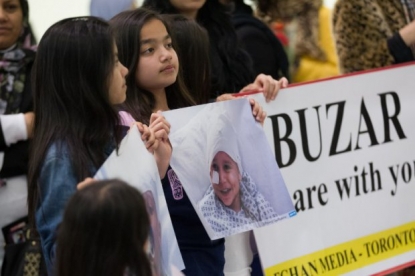 Family and well wishers hold portraits of Abuzar Ahmad as they await the child's arrival at Pearson Airport in Toronto, Ontario, Canada, on April 30, 2014 (AFP Photo / Geoff Robins)
Family and well wishers hold portraits of Abuzar Ahmad as they await the child's arrival at Pearson Airport in Toronto, Ontario, Canada, on April 30, 2014 (AFP Photo / Geoff Robins)The day after his arrival, Abuzar has a complete medical check-up. The doctors confirm he was well cared for in Kabul and set their priorities: teaching him to use his injured left leg normally then, in the months ahead, reinforcing his weakened skull to return it to normal strength.
By the end of May, a new chapter opens in the fast changing life of Abuzar: exactly a month to the day after arriving in Toronto, adopted mum Zohra gives birth to two chubby girls, Tahmina and Sodaba.
Abuzar quickly grows both affectionate and protective toward them: he wants to know where they are at all times, so he can save them from harm. "A typical Afghan big brother already!" His new parents, whom he calls "Mom" and "Dad" in his native Dari laughed.
On June 23 the family gets together to celebrate his third birthday with giant rice dishes, confetti and candles. Abuzar has begun to walk again over the past few weeks, albeit with a limp in his left leg. He has begun physiotherapy to correct it and wears a splint at night.
Doctors made use of his passion for football, which he developed after watching the World Cup in Brazil, to help Abuzar on his journey to recovery. Every night, before sleeping he tells his father to not forget the splint "So that I can play football as soon as possible!"
By the end of the summer Abuzar IS walking almost normally, opening the way for him to go to nursery and lead the life of an average child.
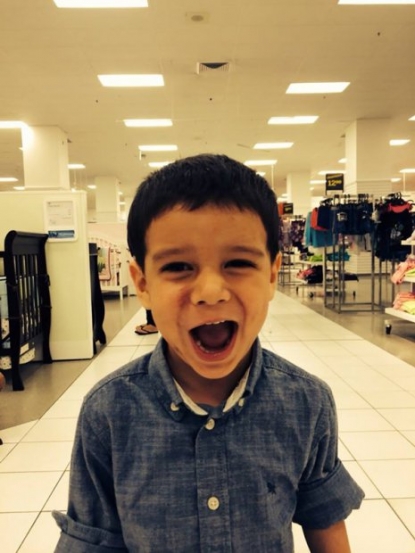
Abuzar in Toronto on July 10, 2014 (Photo by Turaj Rais)
He will learn English very quickly, along with dozens of other children his age from all over the world.
He has begun to swot up this summer by watching cartoons, with a particular taste for Donald Duck and Peppa Pig. He has mastered the basics: "yes", "thank you", "Daddy", "Mommy" and, of course "no" - a well loved word among all three-year-olds - but he remains, according to his family a sweet, curious and happy child.
AFP staff knew Sardar's elder children best, whom he often brought to the bureau on Fridays, his day off. Pretty Nilofar, with her big green eyes and delicate smile, and boisterous Omar, who loved pirate stories and hurtled between desks.
According to many family members, it was Abuzar who took after his father the most. The same intense gaze and shyness when meeting new people. The same cheekiness once he had gotten to know you.
The booming laugh, the beefy body that would hunch over in fits at the slightest opportunity. The obsession with conflict and empathy. Lately, Abuzar had grown tired of watching Tom and Jerry, his family reports. He feels Tom is too mean to Jerry.
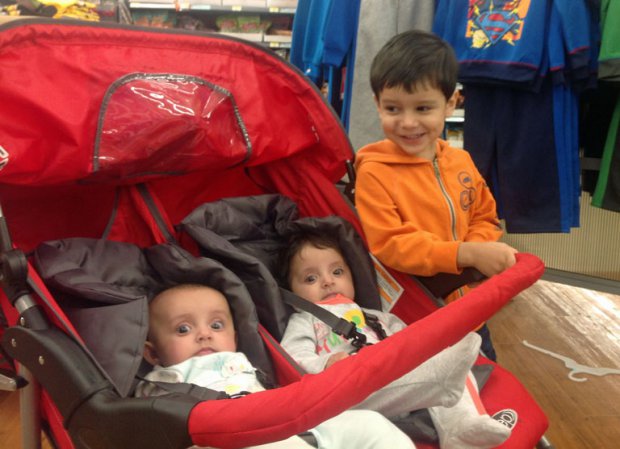
The fate of Abuzar this year mirrored that of his homeland: from the springtime presidential campaign that was marred by bloody attacks, including at the Serena, to the autumn where the country once again appeared on the brink of chaos before the two rival presidential candidates signed a power-sharing deal.
Since his arrival in Canada, he has grown five centimeters (two inches), gained several kilos and appears ready to face his future with the help of his close-knit family. In August, Abuzar and his parents gained permanent residency and the process of acquiring citizenship begins in three years.
In Kabul, Sardar Ahmad loved to invite friends to the shores of Lake Qarga, just south of the city.
Between skewers of kebabs, he shared side-splitting jokes, talked about changing the world and infected everyone with his contagious optimism about how his people would eventually triumph over the miseries that decades of war had brought.
Today, it is on the banks of the Lake Ontario, which borders Scarborough, that his surviving son is rebuilding his life. At the other end of the world, but with the same gleaming black eyes and the same appetite for life.
Emmanuel Duparcq is the AFP chief correspondent for Pakistan and Afghanistan.
While all his immediate needs are being taken care of, AFP is organizing a global collection of donations to help ensure little Abuzar's future wellbeing. To make a donation by credit card or via PayPal, please click here.
More news from the family, as of March 19, 2015: Abuzar underwent successful surgery in January this year, aimed at reinforcing the area around his skull fracture. It was the last step in returning him to the life of an ordinary little boy, who will turn four in June. He is already back in nursery, romping happily about, and is all set to start school come September. His adoptive parents and their two other children (twin girls, also doing just fine) are still living in the same Scarborough building, along with other family members. The AFP appeal has so far raised more than 56,000 dollars, which the family intends to put towards Abuzar's future education.
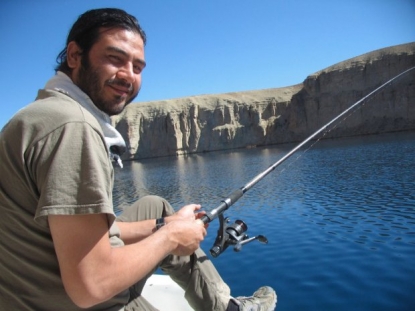 AFP reporter Sardar Ahmad fishes in a lake near Bamiyan on October 17, 2008 (AFP Photo / Danny Kemp)
AFP reporter Sardar Ahmad fishes in a lake near Bamiyan on October 17, 2008 (AFP Photo / Danny Kemp)

